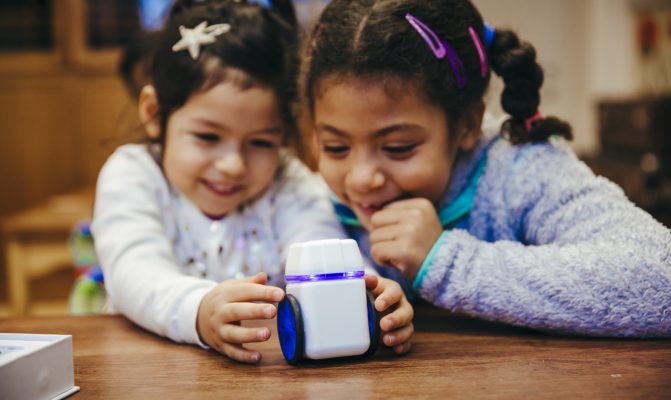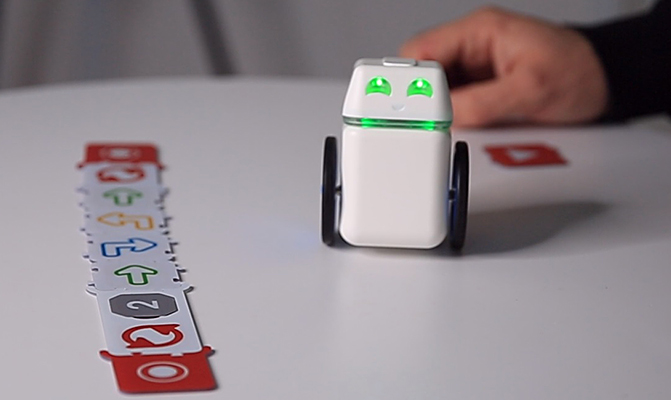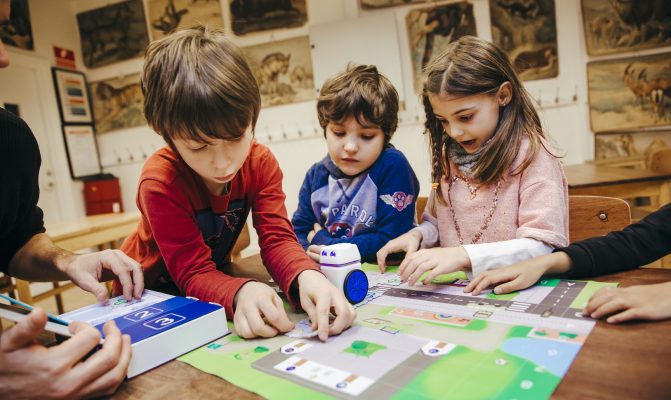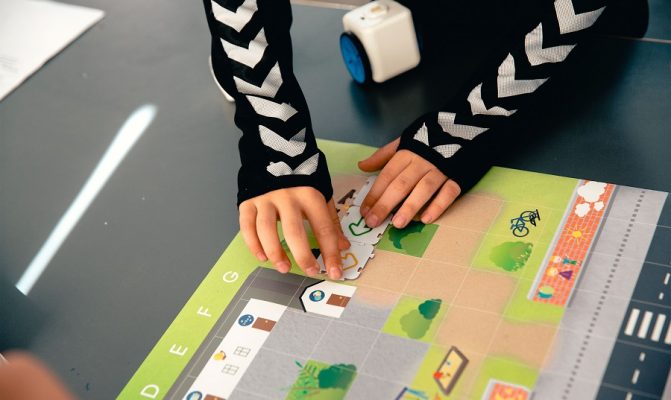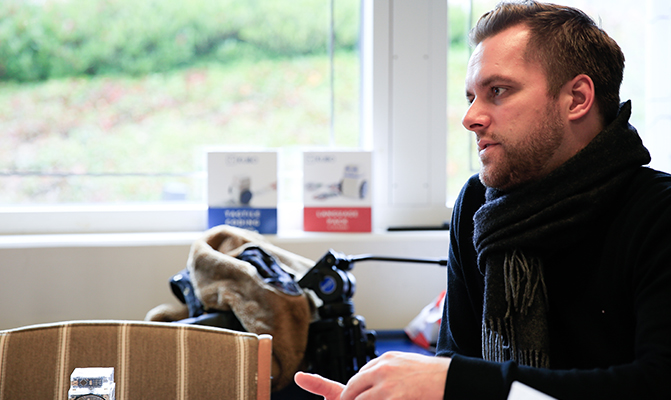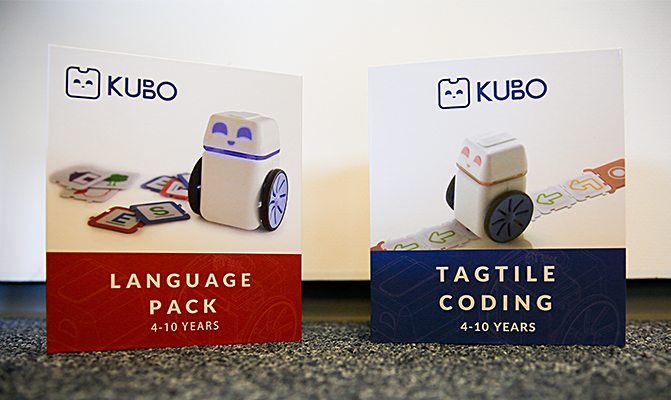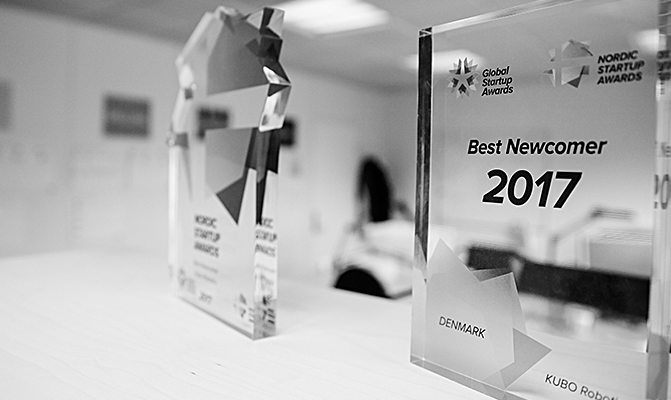Award-winning start-up KUBO Robotics helps teach young children the concept of coding with their interactive robot.
A student project
When entrepreneurs Tommy Otzen and Daniel Lindegaard started their Master project in Learning and Experience Technologies at the University of Southern Denmark in 2014, they didn’t have any specific agenda nor goal – only to find out how children could learn about robots and coding in a fun way.
After working together on several technology projects involving testing students, Tommy and Daniel sat down for a brainstorming session on how to teach children coding without using a screen and without any language barriers. What they came up with was the educational robot Kubo.
A year before graduation, the duo realised they had been working on a highly relevant innovation.
“Everybody was talking about the importance of kids learning to code. Schools were asking for solutions on how to teach their pupils the technology behind coding,” says Tommy Otzen, CEO and Co-founder of Kubo.
“Adding to that, we both had an interest in entrepreneurship and the start-up world. One could say it was a match made in heaven.”
Coding
Today, children spend on average seven to eight hours per day consuming digital content, everything from music and computer games to Netflix. Although it’s a huge part of their everyday lives, most kids don’t understand how the technology behind it all works. For them, it is like magic how the music comes out of their earphones or how the picture appears on the screen.
At the same time, it is estimated that in 2034, a total of 47% of the jobs we know today will be automated by robots or Artificial Intelligence (AI).
“For kids to succeed in this new world, they need a basic understanding of how this technology works and it all starts with the software. We want to help teach them how to think and create things using technology.
“Coding will be an essential skill going forward. This is a trend we see all over the world now. In Swedish schools coding will become a mandatory school subject in 2018.
“We must prepare the children for a future which is already here,” says Tommy.
Understanding the principles behind the technology which surrounds us makes it easier to adapt to our changing world, argues Tommy.
“When my grandmother turned 97, she received a robotic hoover. She was terrified of using it as she didn’t understand how it worked. She thought it drove on its own accord and might knock her over. It wasn’t until she sat down to understand the principles behind the technology – that this was a robot carrying out commands from a human being and therefore had human ethics – that she felt confident enough to start using it around the house.
This is what we want to do at KUBO Robotics, too. We want kids to realise that robot are merely tools to help make certain jobs easier; just like an extension of our own capabilities.”
We must prepare the children for a future which is already here.-Tommy Otzen
Enters Kubo
With their educational background in learning and experiencing technology, Tommy and Daniel possess a deep understanding of the cognitive way the brain works.
“We have combined educational theories with the development of technology. As human beings, we gain information in three different ways. Firstly, language based learning; i.e. talking, reading and writing. This is the most complex way of learning. Secondly, image based learning which is symbols, like a traffic light or a stop sign. The third way of learning, which is how very young children pick up on things, is activity based. They learn by interacting with things. It is essentially learning by doing.
“Kids learn more about the function of water by jumping in a puddle, than they do by looking at an image of water or listening to a text being read aloud”.
The entrepreneurs received good feedback on a prototype of their robot, which was initially tested on first to tenth graders. The robot – named Kubo – introduces children to the concept of coding by teaching them sequential thinking.
By putting the body and head together, Kubo starts. The robot comes with different tiles which all have different meanings; e.g. turn left, turn right, move forward. The child puts the tiles in a certain sequence and the robot will follow the instructions by walking across the path made out for it. By using special maps, the kids can also build their own solutions to get from point A to point B by creating a path for Kubo.
“This is a universal language. No matter what language the children speak, they can easily assemble and start using Kubo.”
IP as a building block
Despite only having started a full-time business in July 2016, Tommy and Daniel have already ran a successful crowdfunding campaign and sold their robot in 39 countries around the world. Schools are their primary target market.
The team accredits their success partly to a solid IP strategy, which has been a cornerstone in their business model and an important aspect when pitching to investors.
“From early on, we knew that we wanted to go global. We understood that we needed funding from investors and having a patent pending demonstrates that you’ve done your groundwork well enough to know that nobody else is doing the same thing. It gives you a good case for investors. They know that you have protected IP so you can’t get copied, or if you do, you can sue them. When you do venture, you might have a go at selling your company at some point and what you sell is basically your IP rights. We had this in mind from the get-go.
“We did a background search to make sure nobody was doing the same thing when we founded our company. Just imagine if we had spent a year of time and investments into this and then realised that we didn’t have the rights to do it – it would have been a catastrophe,” says Tommy.
He adds:
“If you don’t have the IP rights, then how are you going to protect your brand?”
Kubo currently has an international (PCT) patent application, a European patent application pending and three EU trademark registrations, which will be followed by patent applications targeting China, Singapore, Russia, US and Chile – to mentioned but a few. The start-up has been consulted by Johanne Mørk Ahrensbach and Troels Peter Rørdam at Awapatent’s Copenhagen office for their IP matters.
Back to the future
In 2017, Kubo won in the category ‘Best Newcomer’ in the Nordic countries at the prestigious Global Start-up Awards. The victory is taking the team all the way to China for the global awards ceremony at the end of the year.
By preparing children for the future, Kubo are preparing themselves too.
“We are looking into expanding into Europe and US in 2018. In 2019 we want to go global. Our goal is to be the number one choice of educational robots for primary school and I think we are well on our way,” concludes Tommy.
Kubo
For more information on Kubo, please visit their website kubo-robot.com
For IP matters, Kubo has been consulted by Johanne Mørk Ahrensbach and Troels Peter Rørdam at Awapatent’s Copenhagen office.

